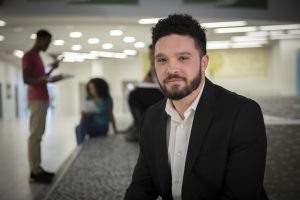Sometimes referred to as perceived fraudulence, you may have heard the term imposter syndrome, being tossed around at award shows, on podcasts, in interviews, and more. Imposter syndrome is a phenomenon that does not discriminate — it can affect celebrities, athletes, working professionals, and anyone in between.
This dreaded phenomenon is very common and affects approximately 70 percent of adults at least once in their lifetime. The basic definition of imposter syndrome is one’s inability to believe their success is deserved. And if you’re reading this right now, there’s a good chance you’ve been at the mercy of this psychological concept.
But fret not, imposter syndrome doesn’t have to stick around. With some understanding of this pesky occurrence combined with introspection and time, you can overcome these feelings of inadequacy to find success and peace in both your personal and professional life.
Understanding imposter syndrome
Sandi Coyne-Gilbert, program director of the Master of Organizational Leadership (MSOL) program here at Goodwin University, is all too familiar with the term herself, as she’s devoted much of her life and career to helping people (oftentimes women in particular,) overcome these heavy feelings as they enter the workforce.
“It is prevalent today,” Coyne-Gilbert explains of the syndrome. “Everyone is afraid of being invisible. And because we’re afraid we’ll be invisible — we shrink.” She goes on to reference a quote from Marianne Williamson: “Our deepest fear is not that we are inadequate. Our deepest fear is that we are powerful beyond measure.” Coyne-Gilbert believes that imposter syndrome ties into this idea. Imposter syndrome gives people a false sense that they must be empowered by someone else in order to acknowledge their own accomplishments. People ask for permission to act on their goals. Coyne-Gilbert stresses the importance of asking for forgiveness instead.
Imposter syndrome affects working professionals at all levels, from leadership to entry-level positions. And Coyne-Gilbert is on a noble mission to rid people of these setbacks to further create more harmonious, safe, and inclusive work environments for all.
As much as imposter syndrome seems like an individual issue, it can set off a chain reaction in the workplace — an insecure leader’s self-doubt can trickle down and impact their employees. Coyne-Gilbert stresses that it’s important for leaders to overcome their insecurities to encourage their employees. “We can’t bloom where we’re planted unless we’re sustained with healthy dirt, water, and nutrients. That’s the part leaders must remember. Leadership is about the people who follow us and count on us.”
To develop as a genuine, reliable, and nurturing leader, it’s crucial to confront any lingering insecurities, feelings of inadequacy, or imposter syndrome. This proactive approach fosters and inspires growth within your team. Fortunately, experts like Coyne-Gilbert are available to provide support.
Build the confidence to lead authentically! Download our free MSOL program guide and learn how Goodwin can equip you with the skills and knowledge to take your leadership to the next level.
Rewrite your story
Imposter syndrome can feel like a constant battle, but there are always ways to fight back and challenge those negative thoughts. When self-doubt whispers that you’re a fraud, ask yourself for evidence. Is it based on reality or just fear? Sandi Coyne-Gilbert feels that fear should be seen as a tool — or as an acronym — Forget Everything And Rise.
What’s the story you’ve been repeating in your head? Do you downplay your achievements by attributing them only to luck and not hard work? Do you question your inclusion in certain spaces? It’s important to rewrite your story and turn it into one of success. Celebrate your wins, both big and small, and commend yourself for your work.
Finally, remember you’re not alone. Even the most accomplished people experience self-doubt. The key is to learn how to manage those feelings while continuing to move forward on your path to achievement. If you need support to address imposter syndrome, talk to a trusted person or seek professional help. With self-compassion and a willingness to learn, you can overcome imposter syndrome and achieve your goals.
Goodwin’s MSOL program
Goodwin’s MSOL program empowers working professionals to become well-rounded leaders by fostering confidence and competence. The curriculum delves into self-discovery through tools like the GRIT scale and the Enneagram test, which help individuals identify their strengths and areas of growth.
Self-awareness tackles head-on obstacles like imposter syndrome, a common hurdle for aspiring leaders. By addressing these internal challenges, graduates gain the confidence to navigate complex situations and create positive work environments. This focus on self-understanding equips them to foster inclusivity and build teams where everyone feels safe to contribute their talents.
Coyne-Gilbert is the first to recommend introspection to overcome feelings of inadequacy. “The more things you do to assess who you are, the greater the likelihood you understand that you have a lot to offer,” she says. She encourages her students to utilize tools in the MSOL program, such as the GRIT scale and Enneagram test, to gain a better sense of who they are. This enables them to enter spaces authentically without seeking approval for their presence or behavior, diminishing those fraudulent feelings of inadequacy.
“Through partnerships with thought leaders and experts in the field, this program will give you the skills you need to make a positive impact in organizational culture, communication, and talent and performance management,” says Coyne-Gilbert.

“If you lack confidence and self-identity, learning who you are through the MSOL program can help you change the narrative from what you don’t have to what you do. You can gain the confidence to put yourself out there.” – Connor Martin, MSOL
Goodwin University’s MSOL program equips students with essential tools to deepen their self-awareness, a critical step in overcoming imposter syndrome. By fostering this self-understanding, students can develop the confidence and authenticity needed to become the altruistic leaders that our world urgently requires. Through personalized support and transformative education, Goodwin empowers individuals to embrace their unique strengths, paving the way for impactful leadership grounded in self-assurance and empathy.
Don’t let imposter syndrome hold you back any longer. Goodwin’s MSOL program can equip you with the tools and confidence to become the leader you were meant to be. Learn more and apply today!

Grace Kuraska is a marketing content writer at Goodwin University where she combines her passion for creativity and storytelling to craft engaging content that resonates with readers. She graduated from University of Connecticut, where she earned her bachelor’s degree in English with a minor in Sociology. Grace brings years of experience in writing, editing, and proofreading to craft compelling narratives that connect with audiences and inspire action.

